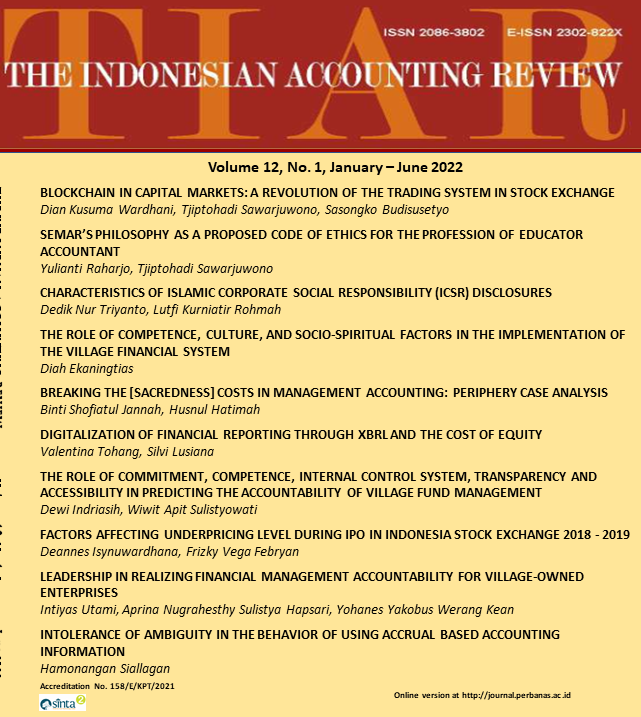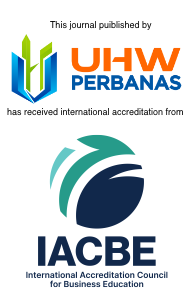Semar's Philosophy as a Proposed Code of Ethics for the Profession of Educator Accountant
DOI:
https://doi.org/10.14414/tiar.v12i1.2442Keywords:
Semar, Kode Etik Profesi, Akuntan PendidikAbstract
The art of wayang kulit (puppit) is one of the original local wisdoms of Indonesia that has been embedded in the culture of the Javanese people for a long time. Each character in wayang kulit has a unique characteristic and a very deep meaning because it provides an overview of life. One example is Semar. Semar is described as a religious, strong, and wise teacher and leader. His behavior reflects the overall human capacity, both in thinking and in choosing an action or decision. This study aims to examine Semar’s philosophy which is used as a proposal in the preparation of a code of ethics for the profession of educator accountants. By using the library research method, this study seeks to examine various literatures obtained from previous studies and books related to Semar’s philosophy to get an overview of the characteristics of Semar and educator accountants. The results of this study conclude that Semar is a simple figure with various unique characteristics. He can be a role model in living life, including being religious, wise, intelligent, honest, earnest, loyal, thorough, never hesitate, professional, and public-oriented. This research is expected to be used as a proposal to the Indonesian Institute of Accountants – IAI and related regulators in compiling a professional code of ethics as a guide for the profession of educator accountant.
References
Agustin, H., & Anita, L. (2009). Persepsi Akuntan Pendidik di Kota Padang Terhadap Ide Pengintegrasian Muatan Etika dalam Kurikulum Akuntansi. Ekuitas.
Ali Muhson. (2004). Meningkatkan Profesionalisme Guru: Sebuah Harapan. Jurnal Ekonomi & Pendidikan.
Alinsari, N., Utami, I., & Marwata, M. (2020). Visual learning methods: strategy for mitigating unethical decisions in accounting education. The Indonesian Accounting Review. https://doi.org/10.14414/tiar.v10i1.1905
Amran, A. (2012). Konsep Adil dan Ihsan Menurut Aqidah, Ibadah dan Ahlak. HIKMAH, Vol. VI, No. 02 Juli 2012, 101-114.
Burhan, N. (2011). Wayang dan Pengembangan Karakter Bangsa. Jurnal Pendidikan Karakter, 1(1). https://doi.org/10.21831/jpk.v1i1.1314
Carito, D. (2000). Lampahan Semar Boyong. Surakarta: Cendrawasih.
Dewi, N., & Riskiana Putri, D. (2018). Peran Sistem Pendidikan Tinggi Dalam Melunturkan Karakter Jujur Mahasiswa. Indigenous: Jurnal Ilmiah Psikologi. https://doi.org/10.23917/indigenous.v3i1.5936
Eltivia, N. (2017). MENGUAK “PANCER†INTEGRITAS AKUNTAN DENGAN FILOSOFI JAWA. Jurnal Riset Akuntansi Dan Keuangan. https://doi.org/10.17509/jrak.v1i3.6695
Endraswara, S. (2014). Politik gaya Sengkuni dan estetika Semar kajian antropologi sastra terhadap pemilu legislatif. Masyarakat, Kebudayaan Dan Politik. https://doi.org/10.20473/mkp.v27i42014.195-205
Fathurrohman, M. (2016). Pengembangan Budaya Religius dalam Meningkatkan Mutu Pendidikan. Ta’allum: Jurnal Pendidikan Islam. https://doi.org/10.21274/taalum.2016.4.1.19-42
Habsy, B. A., Hidayah, N., Lasan, B. B., Muslihati, & Fudholi, A. (2019). The development model of semar counselling to improve the self-esteem of vocational students with psychological distress. International Journal of Emerging Technologies in Learning. https://doi.org/10.3991/ijet.v14i10.10221
IAI. (2020). Kode Etik Akuntan Publik Indonesia. Jakarta: Institut Akuntan Publik Indonesia.
Idhar. (2020). Profil Guru Ideal Dalam Perspektif Al Qur’an. Tajdid: Jurnal Pemikiran Keislaman Dan Kemanusiaan, 4(2), 140–159.
Izzati, A. (2017). Nilai-nilai Konstruk Harmoni Perspektif Tokoh Wayang Semar. FIKRAH. https://doi.org/10.21043/fikrah.v4i2.1631
Kasir, I. (2014). Tafsir Ibnu Kasir. Bandung: Sinar Baru Algensindo.
Kosim, M. (2008). Guru Dalam Perspektif Islam. Tadris.
Martin, D. E. (2011). Culture and unethical conduct : Understanding the impact of individualism and collectivism on actual plagiarism. Management Learning, 43(3), 261–273. https://doi.org/10.1177/1350507611428119
Meilisa, F., & Ludigdo, U. (2010). Persepsi Mahasiswa Akuntansi terhadap Etika Akuntan Pendidik di Jurusan Akuntansi Fakultas Ekonomi Universitas Brawijaya. Jurnal Akuntansi Multiparadigma. https://doi.org/10.18202/jamal.2010.08.7091
Muhaimin. (2002). Paradigma pendidikan Agama Islam: Upaya Untuk Mengefektifkan Pendidikan Agama Islam di Sekolah. Bandung: PT Remaja Rosdakarya.
Nyoman, N., Triani, A., & Yanthi, M. D. (2015). Kesiapan Profesi Akuntan Di Indonesia Dalam Menghadapi Mea. Seminar Nasional Dan The 2nd Call for Syariah Paper.
Pausacker, H. (2004). Presidents as Punakawan: Portrayal of national leaders as clown-servants in Central Javanese Wayang. Journal of Southeast Asian Studies. https://doi.org/10.1017/S0022463404000128
Prasetyo, W. (2012). Perception of Post Graduate Accounting Students on Semar Spiritual Philosophy in Building Accounting Knowledge. Jurnal Akuntansi Multiparadigma. https://doi.org/10.18202/jamal.2012.08.7157
Purwadi. (2014). Mengkaji Nilai Luhur Tokoh Semar. Yogyakarta: Kanwa Publisher.
Rusdiyanto, R. (2019). Upaya Penciptaan Budaya Religius dilingkungan Kampus Universitas Muhammadiyah Jember. TARLIM : JURNAL PENDIDIKAN AGAMA ISLAM. https://doi.org/10.32528/tarlim.v2i1.2070
Sahrani, R., Matindas, R. W., Takwin, B., & Mansoer, W. W. (2014). The role of reflection of difficult life experiences on wisdom. Journal of the Indian Academy of Applied Psychology.
Sahrani, R., Suyasa, P., & Basaria, D. (2018). Kebijaksanaan berbasis Pancasila dan pengukurannya. Dalam Seri Sumbangan Pemikiran Psikologi Untuk Bangsa.
Setyaputri, N. Y. (2017). Karakter Ideal Konselor Multibudaya Berdasarkan Nilai Luhur Semar. Jurnal Kajian Bimbingan Dan Konseling. https://doi.org/10.17977/um001v2i22017p058
Sungaidi, M. (2019). Asketisme Semar: Pergumulan Agama-Sosial. Refleksi. https://doi.org/10.15408/ref.v18i2.12823
Suseno, F. M. (2001). Etika Jawa. Jakarta: Gramedia.
Syuropati, M. A. (2010). Kampus Pintar Kawruh Jawa: Daftar Kata, Nama, dan Istilah Penting dalam Bahasa, Sastra, dan Budaya Jawa (Cetakan I). Yogyakarta: IN AzNa Books.
Tjahyadi, S. (2016). Dekonstruksi Pemahaman Budaya Jawa Tentang Hakikat dan Hubungan Kawula-Gusti pada Lakon Wayang “Semar Kuning.†Jurnal Filsafat, 19(2). https://doi.org/10.22146/jf.3441
Wardaya, S. E. (2018). Kode Etik Akuntan Pendidik: Perspektif Maqashid Syariah. Journal of Research and Applications Accounting and Management. https://doi.org/10.18382/jraam.v3i2.122.
Downloads
Submitted
Published
How to Cite
Issue
Section
License
Copyright (c) 2022 The Indonesian Accounting Review

This work is licensed under a Creative Commons Attribution-NonCommercial 4.0 International License.

















